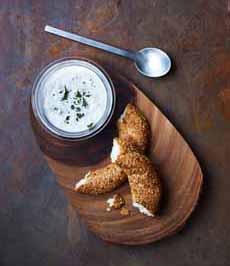
[1] Instead of cream cheese, lowfat Greek yogurt blended with garlic, dill and parsley (photo courtesy Chobani Café (all photos courtesy Chobani).

[2] Use yogurt in different types of sauces. Here, yogurt is blended with cheese as a dipping sauce for Pigs & Blankets, but you could eas easily use it on chicken, grains or pasta.

[3] Use herb-and-spice-flavored yogurt instead of mayonnaise to find chicken salad, potato salad, etc. Here’s the recipe from Chobani.

[4] Baked penne with spinach and sundried tomatoes. Here’s the recipe from Chobani. You can also use a spiced yogurt sauce to top spaghetti and other plain pasta dishes.

[5] Curried grilled salmon topped with raita, a spiced yogurt-cucumber sauce, dip and spread. Here’s the recipe from Chobani.
|
|
How much of the yogurt you consume is sweet, flavored with fruit or vanilla?
How much of it is savory, with no added sweetness?
Many of us have made spicy yogurt dips for crudités, from the simple addition of herbs and spices, to substituting yogurt for higher-calorie mayonnaise and sour cream in artichoke or spinach dips.
Why not extend your use of savory yogurt to every meal? Here are some ideas, inspired by Flavor & The Menu, a magazine and website for creative chefs.
Says the article: The acidic (tangy) bite of yogurt is a refreshing ingredient, that naturally lifts the flavors of other ingredients added to it.
At the same time, yogurt has a neutral flavor profile that pairs well with just about anything.
The magazine named spicy yogurt as one of its Top 10 Culinary Trends for 2018.
USES FOR SAVORY YOGURT
With its tangy dairy notes and creamy mouthfeel, Greek yogurt has long been used to create a variety of savory dishes:
Creamy spreads
Creamy salads, substituting for mayonnaise in coleslaw, chicken salad, egg salad and pasta salad.
To add a creamy finish to sauces.
A replacement for a sour cream topping on baked potatoes, breakfast foods (bagel, oatmeal, pancakes, waffles), chili, soup, tacos.
As a garnish or sauce on any savory food, from chili to chicken to lamb to grilled vegetables…and beyond.
As a tenderizer in a marinade for meats.
In a salad dressing (as mayonnaise or sour cream replacement).
In a dip, simply blended or combined with pesto, hummus or guacamole.
In a smoothie or beverage, for added protein and creaminess.
Stirred into a vegetable purée for creaminess.
Blended with vegetables and frozen as a savory sorbet/palate cleanser.
And more!
Have Some Beet Yogurt Or Carrot Yogurt
One of our favorite techniques is to create containers of vegetable yogurt using purée of beets, carrots, pumpkin and other squash, spring peas and other favorites.
Simply cook and purée the vegetables; then mix them with plain yogurt in proportions to taste.
HOW TO FLAVOR PLAIN YOGURT
Greek-style yogurt is often turned into dips and spreads with the addition of cucumber, garlic, herbs and/or mint (think raita and tzatziki).
Start with Greek-style yogurt, then use high-impact flavors:
Chopped or ground seeds: chia, flax, pumpkin, sesame.
Fresh herbs: basil, cilantro, dill, mint, oregano, parsley, tarragon, thyme.
Heat purées or sauces—Thai curries, harissa, gochujang, togarashi, chiles (ancho, gaujillo, chipotle).
Minced vegetables and pickled vegetables.
Roasted vegetable purées—carrot, sweet potato, tomato.
Spices and seasonings, including chile flakes, Chinese five-spice, cumin, garlic powder, ginger, hot mustard.
Toasted nuts or nut relish.
Vegetable powders—beet powder, matcha powder, mushroom powder, etc.
Whatever you have: coriander chutney, garam masala, mustard, pesto, tamarind, whatever.
It’s almost impossible to make a pairing mistake.
SAVORY YOGURT AT BRUNCH
Here’s how you can use savory yogurt in just one meal category—brunch—suggests Flavor & The Menu.
Here are four ideas; you can create your own versions or find similar recipes on line:
Carrot Pancakes with Za’atar Yogurt: a short stack of savory-sweet carrot and chickpea flour pancakes, griddled golden and puffed, topped with za’atar-spiced yogurt, toasted pistachios and golden raisins.
Cajun Hash Browns with Blue Cheese Yogurt: crispy sweet potato and Yukon Gold potato hash browns topped with a drizzle of tangy-rich blue-cheese yogurt and cayenne-pepper sauce.
Heirloom Tomato and Avocado Yogurt Bowl: Greek yogurt topped with pan-roasted heirloom grape tomatoes, avocado, a swirl of extra-virgin olive oil, toasted pepitas, flat-leaf parsley and coarse-ground sea salt.
Chorizo Chilaquiles with Eggs and Roasted Poblano Yogurt: smoky pinto beans, simmered with corn tortillas and spicy chorizo, topped with a fried egg, crumbled queso fresco and roasted poblano yogurt.
How About Bagels?
An easy creation we like: Greek yogurt blended with garlic, dill and parsley, on a toasted bagel; sliced onions, tomatoes, smoked salmon, cracked black pepper and lemon zest at will (photo #1).
Tip: Mix the spread the night before so the flavors can meld.
|






